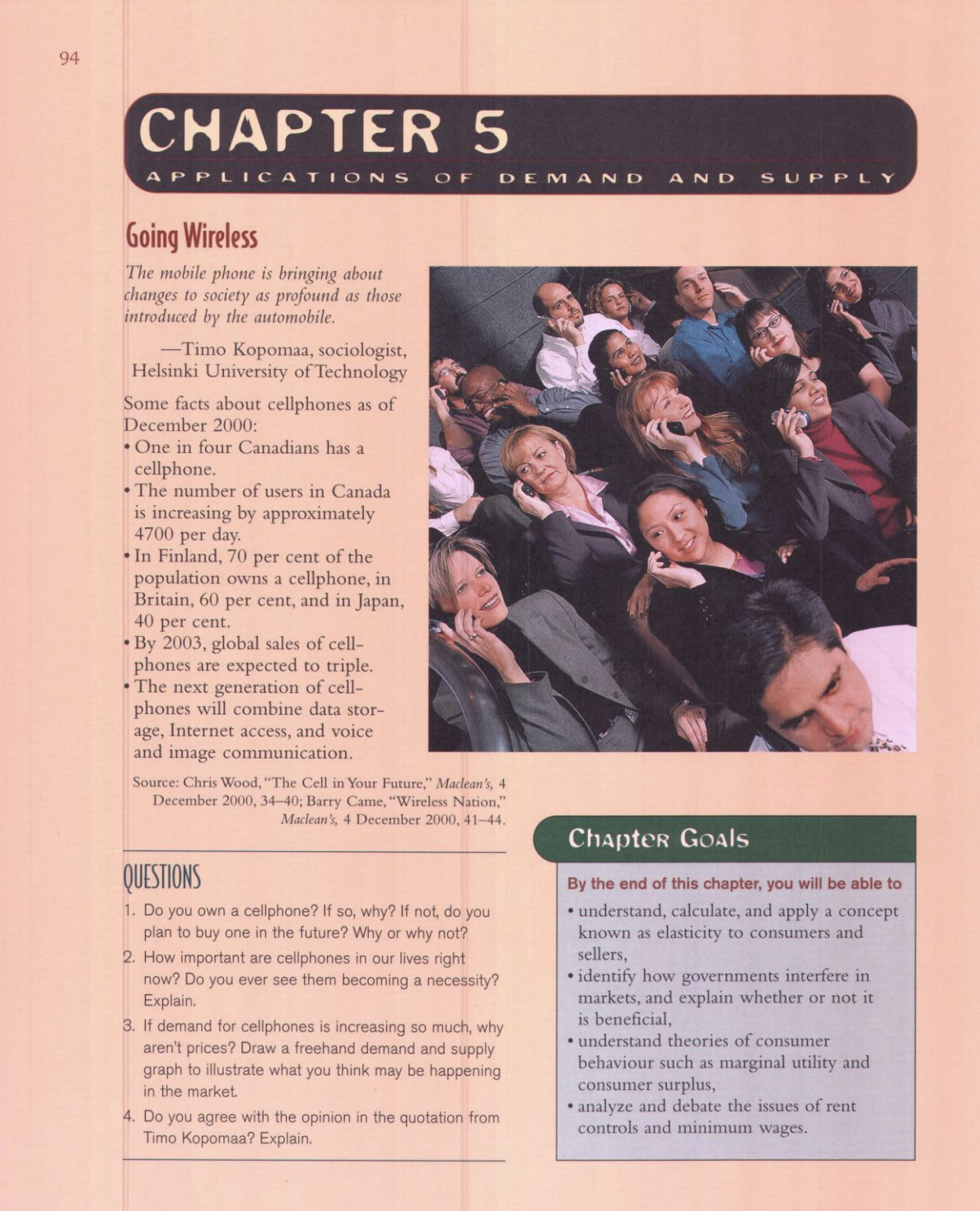Microeconomics: Principles & Policy
14th Edition
ISBN:9781337794992
Author:William J. Baumol, Alan S. Blinder, John L. Solow
Publisher:William J. Baumol, Alan S. Blinder, John L. Solow
Chapter16: Externalities, The Environment, And Natural Resources
Section: Chapter Questions
Problem 2DQ
Related questions
Question
Read the article. How important are cellphones in our lives right now? Do you ever see them becoming a necessity? Explain.

Transcribed Image Text:94
CHAPTER 5
APPL ICAT IONS
O F
DEMA ND
A ND
SUPPLY
Going Wireless
The mobile phone is bringing about
changes to society as profound as those
introduced by the automobile.
-Timo Kopomaa, sociologist,
Helsinki University of Technology
Some facts about cellphones as of
December 2000:
•One in four Canadians has a
cellphone.
• The number of users in Canada
is increasing by approximately
4700 per day.
• In Finland, 70 per cent of the
population owns a cellphone, in
Britain, 60 per cent, and in Japan,
40 per cent.
• By 2003, global sales of cell-
phones are expected to triple.
• The next generation of cell-
phones will combine data stor-
age, Internet access, and voice
and image communication.
Source: Chris Wood, "The Cell in Your Future," Maclean's, 4
December 2000, 34-40; Barry Came, "Wireless Nation,"
Maclean's, 4 December 2000, 41-44.
Chapter Goals
QUESTIONS
By the end of this chapter, you will be able to
• understand, calculate, and apply a concept
known as elasticity to consumers and
sellers,
1. Do you own a cellphone? If so, why? If not, do you
plan to buy one in the future? Why or why not?
2. How important are cellphones in our lives right
now? Do you ever see them becoming a necessity?
Explain.
3. If demand for cellphones is increasing so much, why
aren't prices? Draw a freehand demand and supply
graph to illustrate what you think may be happening
in the market.
• identify how governments interfere in
markets, and explain whether or not it
is beneficial,
• understand theories of consumer
behaviour such as marginal utility and
consumer surplus,
analyze and debate the issues of rent
controls and minimum wages.
4. Do you agree with the opinion in the quotation from
Timo Kopomaa? Explain.
Expert Solution
This question has been solved!
Explore an expertly crafted, step-by-step solution for a thorough understanding of key concepts.
Step by step
Solved in 2 steps

Knowledge Booster
Learn more about
Need a deep-dive on the concept behind this application? Look no further. Learn more about this topic, economics and related others by exploring similar questions and additional content below.Recommended textbooks for you

Microeconomics: Principles & Policy
Economics
ISBN:
9781337794992
Author:
William J. Baumol, Alan S. Blinder, John L. Solow
Publisher:
Cengage Learning

Principles of Economics 2e
Economics
ISBN:
9781947172364
Author:
Steven A. Greenlaw; David Shapiro
Publisher:
OpenStax

Essentials of Economics (MindTap Course List)
Economics
ISBN:
9781337091992
Author:
N. Gregory Mankiw
Publisher:
Cengage Learning

Microeconomics: Principles & Policy
Economics
ISBN:
9781337794992
Author:
William J. Baumol, Alan S. Blinder, John L. Solow
Publisher:
Cengage Learning

Principles of Economics 2e
Economics
ISBN:
9781947172364
Author:
Steven A. Greenlaw; David Shapiro
Publisher:
OpenStax

Essentials of Economics (MindTap Course List)
Economics
ISBN:
9781337091992
Author:
N. Gregory Mankiw
Publisher:
Cengage Learning